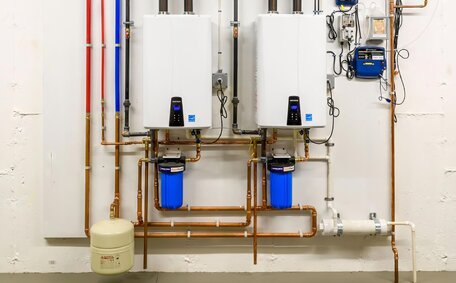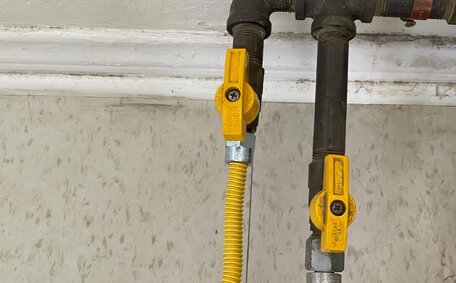
How Hard Water Hurts Hot Water Heaters
Hard water leaves mineral deposits in heaters, pipes and tanks. This limescale reduces efficiency, lifespan and hot water availability. Contact us for affordable water softening solutions.
Read MoreHard water is prevalent in many households, with high levels of calcium and magnesium. In fact, over 85% of American homes are affected to some extent by hard water.
Water hardness, quantified as grains per gallon (gpg), directly contributes to mineral buildup in appliance tanks.
With time, hard water leaves stubborn deposits in your water heater, coating pipes, heating elements, and valves, impeding their function.
This mineral accumulation reduces water flow, traps heat, and creates an insulating layer, similar to a heat exchanger, between the water and the heating source. This diminishes water heating efficiency and necessitates the water heater to work much harder, escalating energy usage and costs.
Hard water leads to scale buildup, corroded pipes, clogged pathways, and premature breakdowns, curtailing the life of appliances like washing machines and water heaters. On top of escalating hard water your utility costs and diminishing water pressure, the accumulating damage necessitates costly repairs and replacements prematurely.
Water in your home carries high levels of dissolved minerals such as calcium and magnesium. As minerals from hard water travel through hot water systems, they precipitate and accumulate, depositing residues. Over time, hard water deposits gather within your plumbing appliances, such as pipes, heating elements, and valves.
Mineral deposits create an insulating layer around heating elements, impairing your plumbing system’s efficiency. The impact hard water your appliance encounters can hinder efficient heat transfer, making the heater labor intensively to maintain desired temperatures. Hard water causes your water heater to work harder, leading to increased energy costs.
Additionally, mineral scale constricts pipes over time, leading to decreased flow rates. Complications such as lowered water pressure can also arise when scale cuts the flow rate of out water. Heat trapped by this insulation forces your water heater to work harder and may lead to overheating.
Heating element buildup can cause corrosion, risking leaks and extensive water heater damage. Valves and moving components become clogged or jammed too. The compounded wear can reduce the lifespan of not just heaters but also damage your home’s plumbing appliances.
There are several clear signs that your hot water system may be struggling due to issues with hard water buildup:
Limescale from hard water obstructs pipes and heating elements, limiting hot water flow rates. This may result in lower water pressure and a reduced supply of hot water from taps and showers.
Buildup around sensors and heating elements leads to inaccurate temperature readings and impeded heat transfer. You likely experience fluctuating water temperatures and intermittent periods of scalding hot or lukewarm water.
Mineral buildup can force your hot water heater to consume more energy and cause inconsistent water temperatures. This increased energy demand strains your heating systems, leading to higher utility bills.
Excessive mineral accretion can also cause loud noises from air traps and water coursing unpredictably through your system.
In your home water system, hard water manifests as white or greyish limescale around faucets and fixtures. You might encounter detrimental impacts on your skin and hair, and notice limescale, soap scum, and stains on dishes, sinks, bathtubs, and laundry, due to hard water from your tankless water heater.
Mineral scale forms an insulating barrier inside the water heater over time, separating the water from the heating elements. This additional stress on the heater, tasked to heat water with hard mineral deposition, reduces efficiency lifespan by forcing it to consume significantly more energy.
Hard water buildup insulation impacts your heater by curtailing its lifespan, compelling the water heater to operate at higher temperatures for extended periods. This spike in energy usage reflects increased energy consumption, showing up directly in higher monthly utility bills.
In many homes with hard water, your electric bill may see a noted 30-40% increase due to compounded inefficiencies. Requiring constant heating with diminishing returns, lifetime operational costs can exceed purchase and installation prices.
To help safeguard your water heater against hard water problems and scale buildup in hot water systems, regular maintenance is vital. It’s generally recommended to flush your water heater at least once per year, but those with very hard water may require more frequent flushing to protect their system.
Flushing promotes the flow of clean water, aiding in sediment removal and rendering the system less susceptible to hard water damage. This simple action helps keep your hot water system flowing without water restrictions and extends its operational lifespan.
The minerals hard water deposits can exert a toll on hot water systems, reducing your home can life expectancy. Your home’s water system, notably the water heater’s tank, grappling with scale buildup and hard water damage, often fails within 8-12 years instead of the expected 15-20 years.
Replacing a failed appliance like a hot water heater prematurely can help lead to substantial costs in repairs, replacements, and installation. Moreover, your home could incur greater financial impact from wasted energy used to compensate for hard water inefficiencies due to mineral deposits before system failure.
On average, homeowners spend 30-40% more per year powering an inefficient system. And these compounding costs rack up year after year, leaving one to wonder how does the initial price of the heater even compare. Attempting to limp along an struggling, damaged heater trying to avoid replacement costs frequently backfires.
Issues like low flow rates and insufficient hot water supply degrade lifestyle quality long before failure. The destructive effects hard water brings to appliance lifespans and how can cause premature failures underscore the importance of prevention.
There are vital strategies like installing water softener systems that defend your hot water system investment from hard water degradation:
Water softening systems are the most effective solution for issues associated with hard water problems. Through ion exchange, these systems remove hardness minerals, greatly reducing scale buildup. Softened water your plumbing transports offers a diminished risk for scale accumulation.
Descalers are effective as limescale can be dissolved, thereby preventing further mineral accumulation. They can be introduced into systems through flushing or as part of treatment byproducts during ion exchange softening, addressing issues caused by hard minerals.
Flushing hot water systems can clear sediment every 6 months before major buildup occurs. Conducting an annual descaling excises mineral buildup, thereby enhancing the performance and affects your water heater positively. Catching problems early better protects system lifespans.
Applying these strategies provides your home with layered security against scale accumulation, corrosion, dropping water pressure, and other hard water problems. A little preventative care goes a long way toward protecting your hot water investment.
Minerals that hard water can deposit often necessitate installing a water softener, an effective way to control and prevent damage. They work through a process called ion exchange which removes the minerals causing the hardness, like calcium and magnesium.
Inside a water softener, resin beads charged with sodium ions transform hard water into soft water. As hard water passes through the tank, the resin beads attract and latch onto the calcium and magnesium ions in exchange for sodium. The water exiting the softener is less likely to have minerals that can build up, offering reduced mineral content.
Once the concerning minerals are eliminated, softened water moving through your water heater and hard water systems poses a reduced risk of scale formation and accumulation. With fewer dissolved particles in your home, water can’t precipitate out and deposit solids on internal surfaces.
The absence of deposits negates the impact hard water has on efficiency, keeping elements, pipes, and valves free from buildup. Heat transfers properly, heater hard water flows freely, and sensors/components function effectively without interference from insulating deposits.
This protection greatly increases the lifespan of your appliances by mitigating buildup limescale, including that found in water heaters and plumbing systems. Preventing scale and corrosion minimises expensive repairs, replacements and the wasted energy trying to compensate for failing hardware. It’s a proven way to control hard water damage through preventative measures.
When installing water softeners isn’t an option, several alternative methods are available to help minimise hard water problems:
Descalers help dissolve existing mineral deposits and prevent further buildup when flushed through hot water systems periodically. They can reduce scale accumulation and corrosion issues over time.
Magnetic conditioners modify mineral compounds, reducing their ability to form scale. As water flows through the magnetic field, deposits lose adhesiveness, improving overall experience when using water in your home. This allows them to be flushed out easier.
Regularly flushing hot water heaters every 3 months removes sediment and prevents heavy accumulation. It’s also wise to inspect components during flushing for early signs of damage needing repair.
While not as comprehensive as water softeners, alternatives like water filters can provide some protection against efficiency losses from hard water. They help improve performance and extend the lifespan of hot water systems.
Even when you have protective measures like a water softener in place, it is still important to flush your hot water system regularly. We recommend flushing every 3-6 months to clear out any sediment that may have built up.
An annual descaling is advised to address how hard water affects the interior of your water heater and pipes. Descaling helps remove any lingering mineral deposits and keeps components clear for optimal efficiency.
Staying on top of preventative maintenance is crucial even with protective measures in place. Flushing and descaling create an extra layer of assurance against sediment accumulation, equipment failures and inefficient operation.
Even with preventative approaches, hard water can cause significant problems in hot water systems over time. There are a few key signs that signal it’s time to call in a professional plumber for assistance:
If you experience a steady decrease in water pressure from sinks and showers—caused hard water scale despite your efforts—mineral scale is likely restricting flow in pipes. Professionals have the tools to clear blockages.
Corrosion, stemming from hard water, deteriorates your pipes’ integrity, which can weaken the system as a whole. Any new leaks likely indicate issues caused by hard water, such as pipe corrosion and degradation of metal components. This warrants full inspection by a specialist.
Rusty, brownish, or chalky water signals concerning water quality issues caused by hard water in your system. Sediment buildup and corrosion have damaged your hot water system, releasing contaminants into the supply lines. Immediate troubleshooting is needed.
If you find yourself needing hot water system repairs more than once per year, it’s time to call the experts. Frequent fixes likely mean your preventative measures are no longer keeping up with hard water damage.
Our licenced Picnic Point plumbers have the technical expertise to accurately assess hard water damage and restore full functionality. We determine the most cost-effective solutions tailored to your unique situation.
Here are some common questions around managing hard water problems in hot water systems:
Although highly effective, water softeners don’t remove all scale-causing minerals, so some buildup may still occur. This is why it is still recommended to flush the system every 6 months.
Flush every 6 months to clear sediment before major buildup. Annual descaling also helps optimise efficiency and longevity.
Seeking help from a plumber like Picnic Point Plumbing is advised if you experience decreasing water pressure, leaks, discoloured water, or need frequent repairs.
Have more questions? Our licenced technicians are happy to discuss your unique hard water situation and recommend the most suitable solutions.
Hard water leaves mineral deposits in heaters, pipes and tanks. This limescale reduces efficiency, lifespan and hot water availability. Contact us for affordable water softening solutions.
Read MoreIt’s important to routinely check your gas appliances for any issues. Signs of problems include gas leaks, strange sounds, odd smells and more. Have a professional inspect your gas appliances annually and service them regularly for safety.
Read MoreUpgrading your gas meter is a simple process completed by registered technicians. It involves disconnecting your gas supply for 15 minutes to swap the old meter for a new digital smart meter. The upgrade is free and improves accuracy.
Read MorePicnic Point, 2213 NSW
We will call back as soon as possible.




